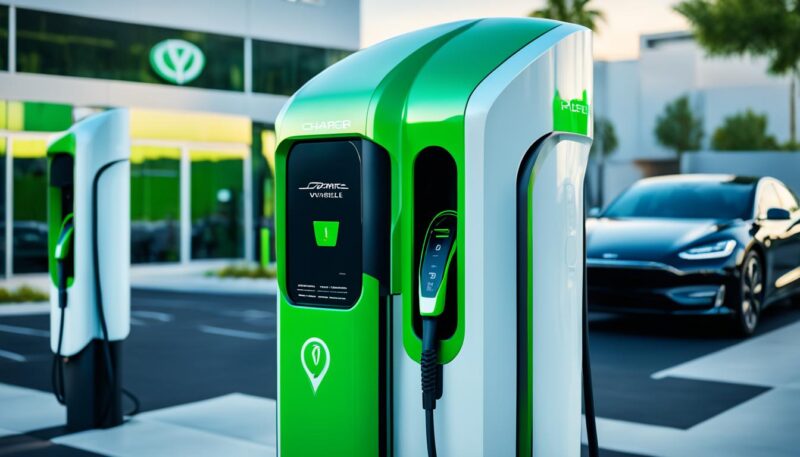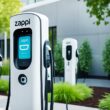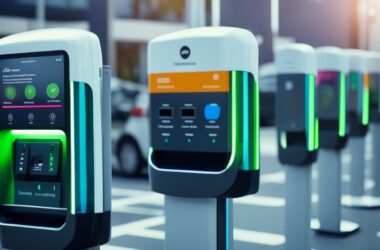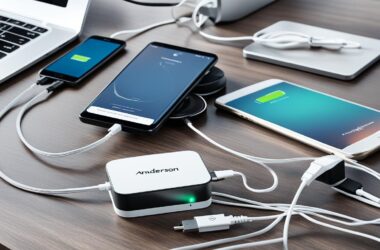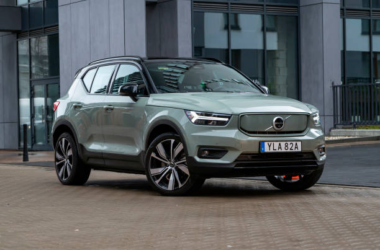I recently discovered the 7kw solo charger, and I must say, it is a game changer for electric vehicle owners. If you’re looking for fast and efficient charging, this high power charger is the perfect solution. With its ability to deliver electricity at a rate of up to 7 kiloWatts, it outperforms the standard domestic three-pin plug, which only provides 2.3 kW.
The 7kw solo charger offers quick and reliable charging, making it an ideal choice for electric vehicle owners who value efficiency and convenience. So, whether you’re at home or a public charging station, this charger ensures that your electric car can get back on the road in no time.
Key Takeaways:
- The 7kw solo charger is a high power charger for electric vehicles.
- It delivers electricity at a rate of up to 7 kiloWatts, which is faster than a domestic three-pin plug.
- This charger provides quick and reliable charging, making it the ideal solution for electric vehicle owners.
- Efficient and convenient, the 7kw solo charger is a top choice for fast EV charging.
- Whether you’re at home or a public charging station, this charger ensures that your electric car can get back on the road quickly.
Home Wallbox EV Chargers: Convenient and Cost-Effective
When it comes to charging your electric car, home wallbox EV chargers are the way to go. Not only do they offer convenience, but they are also cost-effective in the long run. Charging your electric vehicle at home is usually the most convenient option for EV owners. You don’t have to rely on public charging stations or worry about finding an available spot. With a home wallbox EV charger, you have the freedom to charge your electric car whenever you need to, right in the comfort of your own home.
But convenience is not the only advantage of home wallbox EV chargers. They also provide faster and more efficient charging compared to a domestic three-pin plug. While a domestic plug can deliver charging at a rate of 2.3 kW, home wallbox EV chargers can reach a maximum charging rate of 7 kW. This means you can charge your electric car more quickly and get back on the road in no time.
Efficient charging is not only beneficial for your daily routines but also for your wallet. Home wallbox EV chargers provide cost-effective charging, as they are typically more energy-efficient than standard charging options. By charging your electric car at home, you can take advantage of lower electricity rates and potentially save on your overall charging costs.
Whether you have a Tesla Model S, BMW i3, Nissan Leaf, or any other electric car, a home wallbox EV charger is a practical investment. It offers the convenience of charging at home, faster charging speeds, and cost-effective charging. With a maximum charging rate of 7 kW, home wallbox EV chargers provide efficient and reliable charging for electric vehicle owners.
The Benefits of Home Wallbox EV Chargers:
- Convenient and hassle-free charging at home
- Faster charging compared to a domestic three-pin plug
- Cost-effective charging, potentially saving on charging costs
- Efficient and reliable charging for electric vehicles
| Brand | Model | Maximum Charging Rate | Additional Features |
|---|---|---|---|
| Wallbox | Pulsar Plus | 7 kW | Smartphone app control |
| Pod Point | Home Charger | 7 kW | Tethered or untethered options |
| Rolec | WallPod | 7 kW | Compact and affordable |
Top 10 Home EV Chargers for 2024
When it comes to home EV chargers, there are plenty of options available in the market. To help you make an informed decision, I have curated a list of the top 10 home EV chargers for 2024. These chargers have been carefully selected based on their style, price, and functionality, ensuring that you find the best charging solution for your home.
| Charger | Features |
|---|---|
| Andersen A2 | Choice of colors, built-in cable storage |
| Easee One | Compact design, available in different colors |
| EO Mini Pro 3 | Ideal for small spaces |
| Hypervolt Home 3 Pro | Three charging modes, app control |
| Indra Smart LUX | Super-slim, solar power charging option |
| Myenergi Zappi | Integration with renewable energy sources, own display |
| Ohme Home Pro | Dynamic charging technology, energy tariff integration |
| Pod Point Solo 3 | Tethered or untethered options, over-the-air updates |
| Rolec WallPod | Smallest and most affordable option from Rolec |
| Wallbox Pulsar Max | Slim design, app control, competitive pricing |
These home EV chargers offer a range of features to suit different preferences. Whether you prioritize style, compactness, integration with renewable energy, or affordability, there is a charger on this list that will meet your needs.

With the top 10 home EV chargers for 2024, you can expect reliable and efficient charging for your electric vehicle. Choose the charger that best fits your requirements, and enjoy the convenience of charging your EV at home.
Key Features of Select Home EV Chargers
Each home EV charger in the top 10 list offers unique features and specifications. Here are some key details about each charger:
| Charger | Features | Charging Speed | Connection Type | Dimensions |
|---|---|---|---|---|
| Andersen A2 | Sleek design with built-in cable storage | 7kW or 22kW with three-phase electric supply | Type 2 | Dimensions not available |
| Easee One | Compact and available in different colors | 7kW or 22kW with three-phase electric supply | Universal (Type 1 and Type 2) | Dimensions not available |
| EO Mini Pro 3 | Ideal for small spaces | 7kW or 22kW with three-phase electric supply | Type 2 | Dimensions not available |
| Hypervolt Home 3 Pro | Three charging modes, app/Amazon Alexa control | 7kW or 22kW with three-phase electric supply | Universal (Type 1 and Type 2) | Dimensions not available |
| Indra Smart LUX | Super-slim design, solar power option | 7kW or 22kW with three-phase electric supply | Universal (Type 1 and Type 2) | Dimensions not available |
| Myenergi Zappi | Integration with renewable energy sources, own display | 7kW or 22kW with three-phase electric supply | Universal (Type 1 and Type 2) | Dimensions not available |
| Ohme Home Pro | Dynamic charging technology, energy tariff integration | 7kW or 22kW with three-phase electric supply | Universal (Type 1 and Type 2) | Dimensions not available |
| Pod Point Solo 3 | Tethered or untethered options, over-the-air updates | 7kW or 22kW with three-phase electric supply | Type 1 or Type 2 (depending on model) | Dimensions not available |
| Rolec WallPod | Smallest and most affordable option from Rolec | 7kW or 22kW with three-phase electric supply | Universal (Type 1 and Type 2) | Dimensions not available |
| Wallbox Pulsar Max | Slim design, app-controlled, competitively priced | 7kW or 22kW with three-phase electric supply | Universal (Type 1 and Type 2) | Dimensions not available |
These home EV chargers offer a range of charging speeds, connection types, and unique features to suit various needs. Make sure to consider the dimensions and specifications of each charger to find the best option for your electric vehicle charging requirements.
Tethered vs. Universal Chargers: Pros and Cons
When choosing a home EV charger for your electric vehicle, you’ll encounter the option of tethered or universal chargers. Both options have their advantages and considerations to keep in mind.
Tethered Chargers
Tethered chargers come with a charging cable permanently attached to the unit. This means you don’t need to provide a separate cable when you install the charger. The convenience of having the cable ready to use can be a significant benefit, especially if you have limited space or prefer a hassle-free setup.
However, tethered chargers have a limitation. Since the cable is permanently attached, you can’t remove it and take it with you. This may be a drawback if you want the flexibility to use the charging cable with different charging stations or take it on the go.
Universal Chargers
On the other hand, universal chargers require you to supply your own charging cable. These chargers are designed to accept both Type 1 and Type 2 charging cables, giving you the flexibility to charge any electric vehicle equipped with the appropriate cable.
The flexibility of universal chargers allows you to use the charging cable with different charging stations, making it a convenient option if you plan to charge your EV in various locations. Additionally, some universal chargers offer the flexibility to use the portable charging cable on compatible chargers in the Pod Point Network, further expanding your charging options.
Comparison of Tethered vs. Universal Chargers
| Feature | Tethered Chargers | Universal Chargers |
|---|---|---|
| Charging Cable | Permanently attached to the unit | Requires separate charging cable |
| Convenience | Ready to use, no separate cable needed | Flexibility to use with different chargers |
| Portability | Cannot be removed and taken with you | Can be used with different charging stations and taken on the go |
| Compatibility | May have limited compatibility with specific vehicles | Compatible with any EV equipped with the appropriate cable |
When deciding between tethered and universal chargers, consider your charging needs and preferences. Tethered chargers offer convenience, while universal chargers provide flexibility. Assess your requirements for charging at home, on the go, and compatibility with different EVs to choose the charger that best suits your needs.
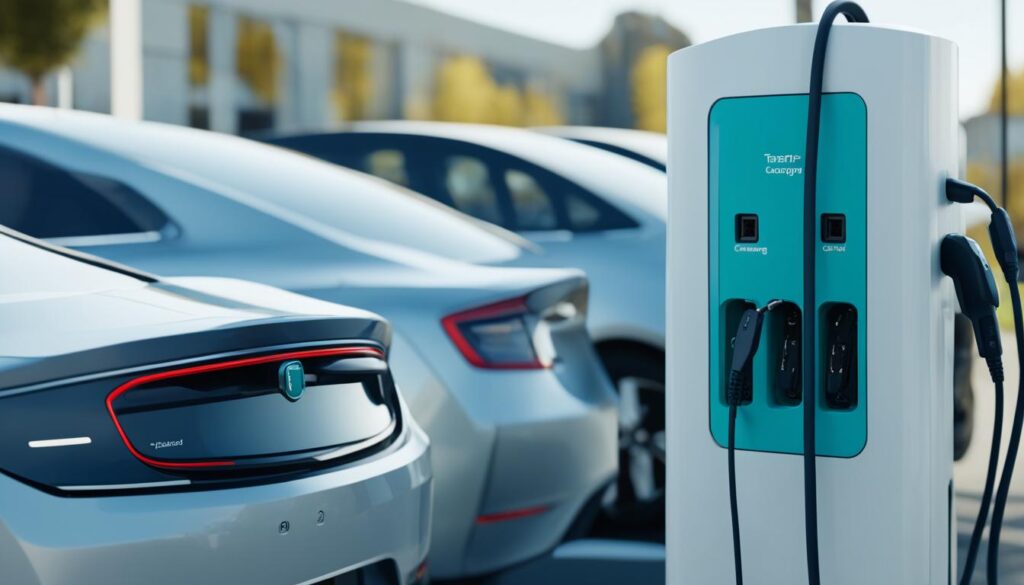
Remember, the choice between tethered and universal chargers depends on your specific circumstances and priorities. What matters most is finding a charging solution that offers the flexibility, convenience, and peace of mind you need as an EV owner.
Conclusion
After careful consideration, it is clear that the 7kw solo charger stands out as the top choice for efficient charging of electric vehicles. With its fast and reliable charging capabilities, this charger provides the ultimate solution for EV owners in the United Kingdom.
Home EV chargers are a convenient and cost-effective way to charge electric cars, offering a range of options to suit different needs. The top 10 choices for 2024 provide a variety of features and specifications to meet the diverse requirements of electric vehicle charging.
Whether you prioritize a compact charger, integration with renewable energy sources, or over-the-air updates, the market has a home EV charger that caters to your needs. Take the time to carefully evaluate the different options, considering their features and specifications, to find the best choice for your electric vehicle charging requirements.





